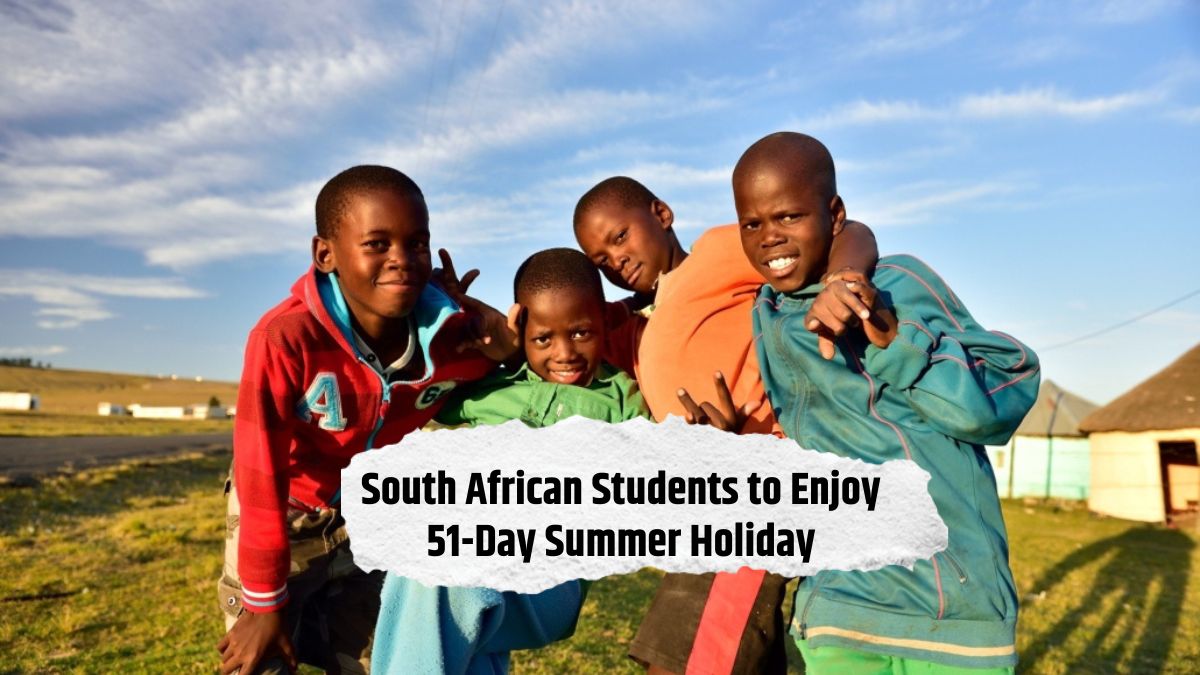South African students are in for a major treat as the Department of Basic Education (DBE) has officially confirmed a 51-day summer break in 2025. This extended holiday period is one of the longest in recent years and has sparked widespread excitement among learners and parents. The move is expected to bring a host of benefits while prompting schools to adopt new academic strategies to maintain curriculum integrity.
The announcement follows a series of consultations and planning within the DBE, and is being praised as a student-first policy aimed at improving mental health, family engagement, and holistic learning experiences.
Positive Impact of a 51-Day Summer Break on Learners
The extended summer holiday is more than just time off—it presents a unique opportunity for students to rest, grow, and reconnect outside the classroom.
- More Family Time: The break allows families to plan extended vacations or spend more quality time at home, deepening emotional connections.
- Skill Development: Students have time to explore extracurricular activities like sports, music, art, and coding, which foster personal growth.
- Mental Reset: With rising concerns over academic burnout, a longer holiday offers vital time to recharge and improve emotional well-being.
- Informal Learning Opportunities: Through travel, volunteering, or even self-led projects, students can engage in experiential learning that broadens their horizons.
DBE’s Preparedness for the Extended Holiday Schedule
The Department of Basic Education is not leaving anything to chance. Several structural and administrative changes are being planned to ensure the school calendar adapts efficiently to this change.
- Revised Academic Calendar: The school year will be adjusted to ensure the curriculum is completed without compromising learning outcomes.
- Accelerated Teacher Training: Teachers will undergo training workshops to help them maximize classroom time post-break.
- Parental Involvement: DBE will issue guidelines for parents, offering ideas and support on how to keep children active and productive.
- Enhanced School Resources: Schools will receive additional tools and learning materials to help students ease back into studies.
- Clear Communication Channels: The DBE will maintain regular updates through SMS, emails, and their website to keep stakeholders informed.
How South Africa’s Summer Break Compares Globally
South Africa’s new 51-day break is significant, but how does it compare with international school holiday norms?
| Country | Break Duration | Benefits | Challenges | Adaptation Strategies |
|---|---|---|---|---|
| South Africa | 51 days | Family bonding, extracurricular development | Curriculum compression | Revised teaching framework |
| United States | 75–104 days | Travel, summer camps | Academic learning loss | Enrichment programs |
| United Kingdom | 39–49 days | Short local getaways | Limited downtime | Holiday workshops |
| Australia | 40–60 days | Outdoor activities | Summer heat limitations | Seasonal adjustments in planning |
The DBE’s decision reflects a global trend: rethinking education to balance academic rigor with student well-being.
Tips for Parents: Making the Most of the 51-Day Holiday
While the long break offers flexibility, structured engagement will be key to making it beneficial for children. The DBE is encouraging active parental involvement.
Here’s how parents can prepare:
- Plan Balanced Activities: Combine educational, recreational, and creative tasks to keep kids engaged.
- Encourage Reading Habits: Promote daily reading sessions with books tailored to age and interests.
- Promote Outdoor Play: Allow time for nature exploration, sports, and unstructured outdoor games to support physical health.
- Foster Community Involvement: Engage children in volunteering, clean-up drives, or local cultural events to build empathy and responsibility.
- Support Hobbies: Whether it’s drawing, music, DIY crafts, or coding, help children pursue a creative or technical interest during the break.
Department’s Contact Details for More Information
For official updates, calendars, and parental guidelines, you can reach out to the Department of Basic Education using the contact details below:
- Website: www.education.gov.za
- Phone: +27 12 357 3000
- Email: [email protected]
- Office Address:
Sol Plaatjie House,
222 Struben Street,
Pretoria, 0001
Stakeholders are encouraged to regularly check the website and follow DBE’s official communications for accurate and timely updates.
A Strategic Move to Support Student Well-Being
Officials at the DBE have described the extended summer break as a strategic investment in the long-term educational success of South African students. It reflects a shift in focus toward mental health, family cohesion, and out-of-classroom development, while ensuring academic targets remain on track.
As the 2025 school year progresses, all eyes will be on how schools, students, and families adapt to this change. With the right approach, the 51-day summer holiday could become a model for future education reforms—one that prioritizes both academic achievement and personal growth.
